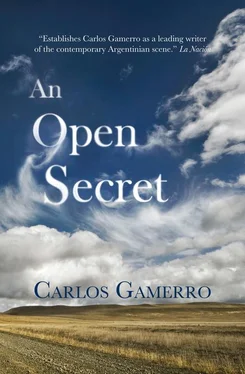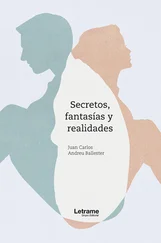“I’m beginning to think,” I tell him, “they’re not far wrong — the people who say Neri — wanted to spare Ezcurra — He might’ve really — meant it — he might’ve really believed — that by telling everyone — they’d stop him — and in a way — he became the instrument — the executioner, but not the judge — of what the people wanted — that it was Malihuel, not him — that decided Ezcurra should die — and that afterwards” (I’ve got a pain in the pit of my stomach now) “they washed their hands — saddled him — with the blame” (I can’t draw a full breath) “they made him a scapegoat — and they bad-mouth — him — to cover up their tracks — and he — by killing Ezcurra — was only — complying with — the will — of the people?” I finish with a wheeze and pull up, panting, unable to go any further. Jogging on the spot, Guido offers to wait for me. We haven’t yet completed the first of the eight kilometres he normally covers. I tell him to go on alone, that I’d rather take advantage now that it isn’t too far to walk back, and once his energetic figure disappears round a wooded bend in the path I light up and smoke my cigarette leaning against a post, watching the waterbirds take off and land on the steel-grey waters of the lagoon.
“BEHIND EVERY ONE of the Superintendent’s questions,” states Don Augusto Noel, now as then owner of the Trigo Limpio bakery, ‘Malihuel’s Number One’, “there was a veiled threat. Know what he suggested when it became clear I was reluctant to give him the support he was after? That if we didn’t sort things out ourselves the milicos would move in from Rosario and quite a few more would end up carrying the can. The righteous end up paying for the sinners was how he put it, who knows how he told them apart. Know what else he said? I can remember him standing there clear as daylight. Better if this matter remains in police hands Don Augusto. You know what the difference between the milicos and the police is? Us policemen fish with a hook, the milicos use a net. It’s up to all of you,” Don Augusto recalls, tongs in hand, before asking me, “Shall I put some vigilantes on too?”
AND ONE NIGHT, a Saturday as it happens, my mind, blunted by the exponential proliferation of voices, reaches saturation point and I take to the streets in search of some relaxation too disgraceful to confess to my hosts, who, since my arrival, have generously granted me the use of either of their two Fiat Unos, though out of deference to Guido’s extra headlights and souped-up engine I always take Leticia’s. I park half a block from the infamous Kawasaki Bar and the moment I’m inside I confirm that the good townspeople have been understating their execration. The Kawasaki is a godforsaken dive within whose walls bedecked with cave paintings of fluorescent rockers and laminated posters of motorcyclists and motorists painted in primary and complementary acrylics circulate twenty or so longhairs in leather jackets and big-collared shirts unbuttoned to the sternum, followed around by a barely less numerous band of little cumbia-dancing spades flaunting rotund thighs beneath their skimpy miniskirts or an abundant volume of buttock moulded by the biting white cloth of their trousers. The jukebox oscillates between heavy-metal numbers — outdated before they became dated — and the usual cumbia rhythms. The drinks lined up behind the precarious bar are unalleviatedly foul, and the service slow and gruff — the place is, from one end to the other, exactly what I needed and I soon find what I came looking for. Precariously balanced over the black hole of the toilet I separate two lines of charlie, cut with that other, unnamed soap powder that never passes the test in the TV ads, and further emboldened by a shot of gin I go up to the only face I recognise in the crowd. If she can’t tell from my sudden verbal outpouring and my sparkling corneas, she must have a very good nose because, after a few minutes, she accepts my proposal unquestioningly and walks at my side the few blocks that separate us from the darkest dirt streets. For half a joint of the more than decent local weed and what’s left of the soapy coke she lets me fuck her against the shadowy corner of a deserted hallway; I could have driven her out to the Mochica but I’m aroused by the echo of my vague teenage memories, and the cold on her nipples that no bra separates from her T-shirt. It isn’t love, but for once it spares me the tiresome process of spanking one out in a house not your own. Two days later, when I go into the telephone exchange, Soledad predictably pretends not to recognise me, or more accurately, pretends only to recognise the man who makes regular if ever less frequent visits, asking for a booth to call Buenos Aires.
“NO FILES,” Leticia warns me, wolfing down one croissant after another, having been kept at the court until four without lunch. “Nothing before eighty-three. They were all lost in the floods, ours and the police’s. When the flood waters went down we discovered that the ones below the waterline had turned to pulp and those above it were covered in enormous pouffe-like balls of furry green mould. The shelves were made of wood and sucked up the water like a siphon. The ones in the Civil Registry and the Inland Revenue fared better — they’re a bit higher up and have metal shelves. They lost documents dating back to the days of Comandante Pedernera and the foundation. Anyway at best you’d’ve been able to confirm there wasn’t anything there about the Ezcurras. None of that was recorded in the guards’ logbook and no files were opened, not a thing. I couldn’t say if they kept parallel or secret files. But nothing for you or me or even the judge to’ve looked at.”
“ Che tell me,” I tell her, “you work there, I mean you’re right next door aren’t you? Can’t you get me a visit to headquarters, an interview with the current chief, or some other? …”
“Sure, course I can, I’ll talk to the judge, I shouldn’t think there’ll be a problem,” Leticia enthusiastically agrees, and we fall to discussing the subject. When he gets home and we tell him, Guido buries the plan with a shovelful:
“I wouldn’t tango with the cops if I were you.”
“IF YOU WANT TO KNOW what was going on inside headquarters,” Iturraspe tells me one night when not even all the gas fires in Los Tocayos can keep the glacial cold at bay, “the man you should talk to’s Sayago. He was a cop back then and word is that he was well in on it. Know where to find him Guido?”
“In the FONAVI social-housing estate right?” my friend replies.
“Lives in his sister’s house you know the one behind Ña Agripina’s. But don’t go and see him there, he’ll smell a rat and you won’t get a word out of him. Get him to come here and offer to pay for his drinks. It can’t fail.”
ÑA AGRIPINA, the local healer, is no dishevelled, toothless, wrinkled Indian crone as folklore dictates, nor does she drag sandals across the tamped-down dirt floor of an adobe shack. On the kitchen walls of her little house in the FONAVI district, within its green roof and bare bricks, there are no painted-plaster statuettes of St George, or red candles, or pygmy-owl feathers: two little old china figures talking on the phone, connected by a black flex, a rectangular tray with a tropical sunset in furious oranges and blacks, a wall clock in the shape of a gigantic golden wristwatch that in mythical times may have graced the wrist of a Titan. She herself is on the diminutive side, her dyed, spongy hair in an abundant perm over her heavily made-up eyes and mouth, her cream rayon blouse separated from her double chin by several ropes of fake pearls, her feet embedded in faded, bunion-battered flat-soled shoes.
Читать дальше












